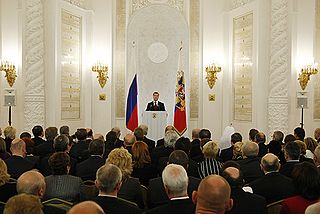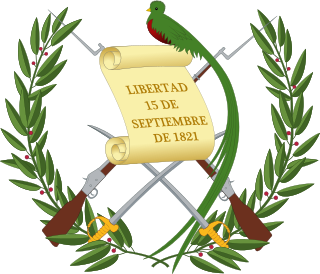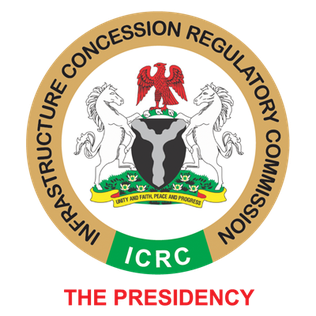Related Research Articles

The federal government of Nigeria is composed of three distinct branches: the executive, the legislative, and the judicial, whose powers are vested and bestowed upon by the Constitution of the Federal Republic of Nigeria. One of the primary functions of the constitution is that it provides for separation and balance of powers among the three branches and aims to prevent the repetition of past mistakes made by the government. Other functions of the constitution include a division of power between the federal government and the states, and protection of various individual liberties of the nation's citizens.

Nigeria is a federation of 36 states, each of which is a semi-autonomous political unit that shares power with the federal government as enumerated under the Constitution of the Federal Republic of Nigeria. In addition to the states, there is the Federal Capital Territory (FCT), in which the capital city of Abuja is located. The FCT is not a state, but a territory of the federal government, governed by an administration headed by a minister. Each state is subdivided into local government areas (LGAs). There are 774 local governments in Nigeria. Under the Nigerian Constitution, the 36 states enjoy substantial autonomy but are not sovereign entities, as ultimate authority lies with the federal government. Amendments to the constitution can be proposed by the National Assembly, but for an amendment to be valid, it must be approved by a two-third majority of the 36 state legislatures, as required under Section 9 of the 1999 Constitution of Nigeria.

A commander-in-chief or supreme commander is the person who exercises supreme command and control over an armed force or a military branch. As a technical term, it refers to military competencies that reside in a country's executive leadership, a head of state, head of government, or other designated government official.

The president of Nigeria, officially the president of the Federal Republic of Nigeria, is the head of state and head of government of the Federal Republic of Nigeria. The president directs the executive branch of the Federal Government and is the commander-in-chief of the Nigerian Armed Forces.
The Principles of Good Laboratory Practice (GLP) establish rules and criteria for a quality system that oversees the organizational processes and conditions in which non-clinical health and environmental safety studies are planned, conducted, monitored, recorded, reported, and archived. These principles apply to the non-clinical safety testing of substances found in various products to ensure the quality and integrity of the safety data submitted to regulatory authorities globally.

The Socialist Constitution of the Democratic People's Republic of Korea is the constitution of North Korea. It was approved by the 6th Supreme People's Assembly at its first session on 27 December 1972, and has been amended and supplemented in 1998, 2009, 2012, 2013, 2016, 2019 (twice), 2023 and 2024. It replaced the country's first constitution which was approved in 1948.

The Chairman of the State Duma of the Federal Assembly of the Russian Federation, also informally called Speaker (спикер), is the presiding officer of the lower house of the Russian parliament. It is the fourth highest position, after the President, the Prime Minister and the Chairman of the Federation Council, in the government of Russia. His responsibilities include overseeing the day-to-day business of the State Duma, presiding and maintaining order at the regular sessions of the parliament. The Speaker also chairs the Council of the Duma which includes representatives from all the parliamentary parties and determines the legislative agenda.

The Federal Executive Council (FEC), also simply known as The Cabinet is the cabinet of ministers of the Federal Republic of Nigeria and is part of the executive branch of the Government of Nigeria. The council's role, as written in the Ministers' Statutory Powers and Duties Act, is to serve as an advisory body to the President of Nigeria, who serves as the FEC's chairman. Members of the cabinet are appointed by and report to the President, who can dismiss them at will. The cabinet currently consists of 24 Federal Ministries, each responsible for some aspect of providing government services, as well as a number of parastatals (government-owned corporations).

The Economic and Financial Crimes Commission (EFCC) is a Nigerian law enforcement and anti-graft agency that investigates financial crimes and unknown transactions such as advance fee fraud and money laundering. The EFCC was established in 2003, partially in response to pressure from the Financial Action Task Force on Money Laundering (FATF), which named Nigeria as one of 23 countries non-cooperative in the international community's efforts to fight money laundering. The agency has its head office in Abuja, Nigeria. The EFCC was also set up to fight against corruption and protect the country from economic saboteurs.

The annual Presidential Address to the Federal Assembly is a speech given by the Russian President to outline the state and condition in which Russia is in. It is given in front of a joint meeting of the two houses of the Russian Parliament: the State Duma and Federation Council. Article 84 of the current Constitution of Russia enacted in 1993 says "The President of the Russian Federation shall: address the Federal Assembly with annual messages on the situation in the country, on the guidelines of the internal and foreign policy of the State". First Russian President Boris Yeltsin delivered the first Address to the Federal Assembly on 24 February 1994. The date of the presidential address is not fixed.
Constitutional reform in the Philippines, colloquially known as charter change (cha-cha), refers to the political and legal processes needed to amend the current 1987 Constitution of the Philippines. Under the common interpretation of the Constitution, amendments can be proposed by one of three methods: a people's initiative, a constituent assembly or a constitutional convention.

The constitution of Nigeria is the written supreme law of the Federal Republic of Nigeria. Nigeria has had many constitutions. Its current form was enacted on 29 May 1999 and kickstarted the Fourth Nigerian Republic.

The Constitution of Guatemala is the supreme law of the Republic of Guatemala. It sets the bases for the organization of Guatemalan government and it outlines the three main branches of Guatemalan government: executive branch, legislative branch, and judicial branch.

The Law of Nigeria consists of courts, offences, and various types of laws. Nigeria has its own constitution which was established on 29 May 1999. The Constitution of Nigeria is the supreme law of the country. There are four distinct legal systems in Nigeria, which include English law, Common law, Customary law, and Sharia Law. English law in Nigeria is derived from the colonial Nigeria, while common law is a development from its post-colonial independence.

The 1974 Yugoslav Constitution was the fourth and final constitution of the Socialist Federal Republic of Yugoslavia. It came into effect on 21 February 1974.

The Infrastructure Concession Regulatory Commission (ICRC) is an agency of the Federal Government of Nigeria responsible for the development and implementation of the Public-Private Partnership (PPP) framework for the provision of infrastructure services.
National Population Commission (NPC) is the principal data mining commission of the Federal Republic of Nigeria, responsible for collecting, collating, analysing and publishing data about the Nigerian people and economy. The commission is under the supervision of the Office of the Presidency (Nigeria), and its head is appointed by the President of Nigeria.
The Revenue Mobilization Allocation and Fiscal Commission is an agency of the Federal Republic of Nigeria that oversees the revenues accruing to and disbursement of such funds from the Federal Account. The Body also ensures that there is conformity and equity in the nation's revenue allocation formulae.
Muheeba Farida Dankaka OON is an entrepreneur and the chairman of the Federal Character Commission in Nigeria. She was appointed by President Muhammadu Buhari in 2020 and confirmed by the Senate same year. Previously, she served as chairman of Kaduna State Chamber of Commerce, Industry Mines and Agriculture (KADCCIMMA).
Centre for Black and African Arts and Civilization (CBAAC) is an agency of the Federal Republic of Nigeria under the Federal Ministry of Information and National Orientation that oversees initiatives to recover and revitalize the cultural and natural legacy of African descendants. Through its efforts, the centre aims to safeguard, conserve, and promote this heritage, thereby enhancing its understanding and appreciation.
References
- ↑ "Third Schedule. C - Federal Character Commission". 13 April 2014. Retrieved 2024-11-29.
- ↑ https://lirias.kuleuven.be/retrieve/549989
- 1 2 "THE FEDERAL CHARACTER COMMISSION". 2024.
- ↑ "Understanding Federal Character Principle in Nigeria". www.stears.co. Retrieved 2024-11-29.
- ↑ Nwafor (2020-06-02). "Senate confirms Dankaka as chairman, FCC, 36 others". Vanguard News. Retrieved 2024-11-29.